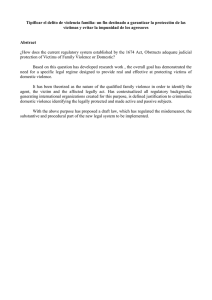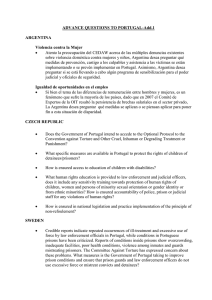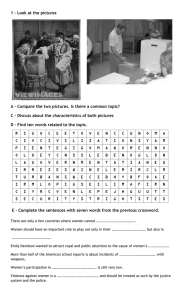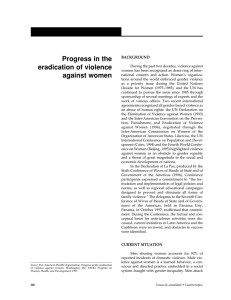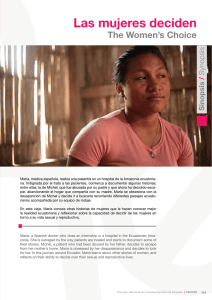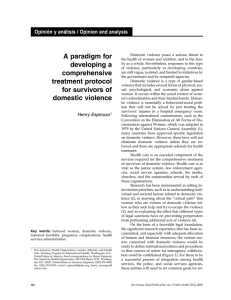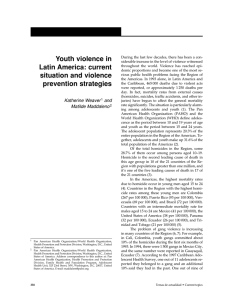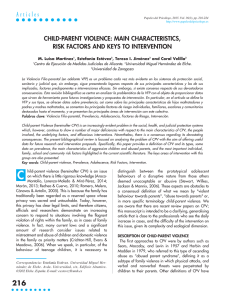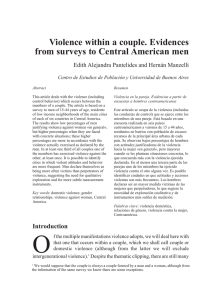Red Chilena contra la Violencia hacia las Mujeres
Anuncio
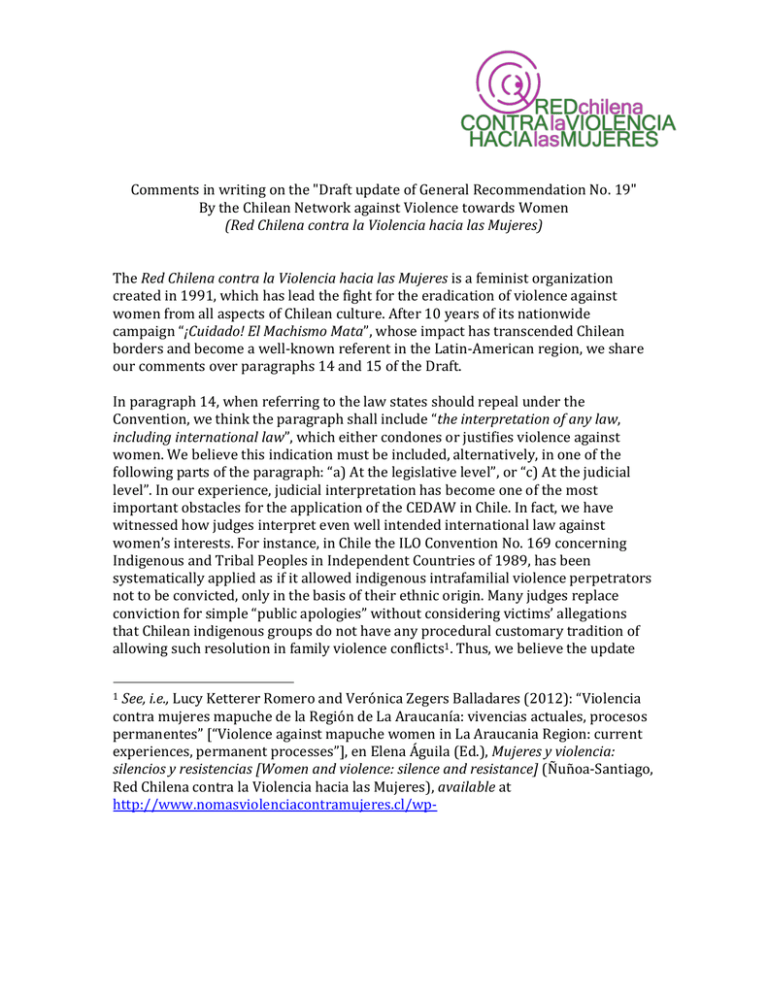
Comments in writing on the "Draft update of General Recommendation No. 19" By the Chilean Network against Violence towards Women (Red Chilena contra la Violencia hacia las Mujeres) The Red Chilena contra la Violencia hacia las Mujeres is a feminist organization created in 1991, which has lead the fight for the eradication of violence against women from all aspects of Chilean culture. After 10 years of its nationwide campaign “¡Cuidado! El Machismo Mata”, whose impact has transcended Chilean borders and become a well-known referent in the Latin-American region, we share our comments over paragraphs 14 and 15 of the Draft. In paragraph 14, when referring to the law states should repeal under the Convention, we think the paragraph shall include “the interpretation of any law, including international law”, which either condones or justifies violence against women. We believe this indication must be included, alternatively, in one of the following parts of the paragraph: “a) At the legislative level”, or “c) At the judicial level”. In our experience, judicial interpretation has become one of the most important obstacles for the application of the CEDAW in Chile. In fact, we have witnessed how judges interpret even well intended international law against women’s interests. For instance, in Chile the ILO Convention No. 169 concerning Indigenous and Tribal Peoples in Independent Countries of 1989, has been systematically applied as if it allowed indigenous intrafamilial violence perpetrators not to be convicted, only in the basis of their ethnic origin. Many judges replace conviction for simple “public apologies” without considering victims’ allegations that Chilean indigenous groups do not have any procedural customary tradition of allowing such resolution in family violence conflicts1. Thus, we believe the update See, i.e., Lucy Ketterer Romero and Verónica Zegers Balladares (2012): “Violencia contra mujeres mapuche de la Región de La Araucanía: vivencias actuales, procesos permanentes” [“Violence against mapuche women in La Araucania Region: current experiences, permanent processes”], en Elena Águila (Ed.), Mujeres y violencia: silencios y resistencias [Women and violence: silence and resistance] (Ñuñoa-Santiago, Red Chilena contra la Violencia hacia las Mujeres), available at http://www.nomasviolenciacontramujeres.cl/wp1 shall include in paragraph 14 some indication against this type of interpretation, which is making mapuche and other indigenous women more vulnerable to genderbased violence. In paragraph 15, we have two separated comments. One is connected, again, with the interpretation of the law, and the other refers to data collection. Our first comment over paragraph 15, related with the comment above about paragraph 14, is that the letter j) must begin with the following words: “Repeal all legal provisions and interpretation of any provision, including international law, (…)”. We believe the addition of the highlighted words shall prevent situations such as the interpretation of ILO Convention No. 169 already described. Our second comment on paragraph 15 is that the subtitle “Data collection and monitoring” must add in its letter b) the indication that these systems should disaggregate information even if the national criminal law does not include hate crimes against women that are different of those already punished. In fact, in Chile the Criminal Code only considers gender-violence crimes in the context of Intrafamilial Violence. We do not have a Violence Against Women Act, and even the recently enacted “femicidio” crime is a mere parricide, with the same requirements and the same punishment than a parricide, but called femicide if the victim is a woman2. Our criminal law does neither contemplate any special measurement nor punishment for homicides and assaults against women beyond the family scope. As a result, our criminal system does neither collect, analyze nor publish statistical data on gender-based violence against women that occurs outside the family. Besides, in such fragmented conceptualization of the issue, the criminal system is far from content/uploads/2015/11/mujeres_y_violencia_silencios_y_resistencia.compressed. pdf; Rosario Palma Ayala, “Mujer mapuche y retos de la justicia intercultural: aplicación del derecho propio indígena en delitos de violencia intrafamiliar” [“Intercultural justice challenges and the Mapuche women: indigenous law in domestic violence cases”], 10 Anuario de Derechos Humanos (2014), pp. 151-161 (criticizing several Temuco’s Court of Appeals’ decisions), available at http://www.anuariocdh.uchile.cl/index.php/ADH/article/viewFile/31704/33504 2 See Código Penal Art. 390, modified by Law 20.480 (Chile, 2010). collecting information about intersectional discrimination against women. All of these problems, we believe, impede treating violence against women as the continuum it actually is, and pose obstacles for the defragmentation of the issue in both legal and public policy responses3. Therefore, we think the paragraph 15 must be specific in the fact that, even if the state still does not include particular crimes in all gender-based violence against women scenarios, it must collect disaggregated data in a way that allows the study of the phenomenon of violence against women under more comprehensive approaches. The Red Chilena contra la Violencia hacia las Mujeres thanks the opportunity for making comments in this Draft. Best Regards, Silvana Del Valle Lorena Astudillo Soledad Rojas Carolina Ibacache Sandra Palestro Chilean Network against Violence towards Women’s National Coordination Committee See, for instance, Carmen Durán Carrasco (Ed., 2015), El continuo de violencia hacia las mujeres y la creación de nuevos imaginarios [The violence against women continuum and the creation of new models] (Santiago, Red Chilena contra la Violencia hacia las Mujeres). 3
